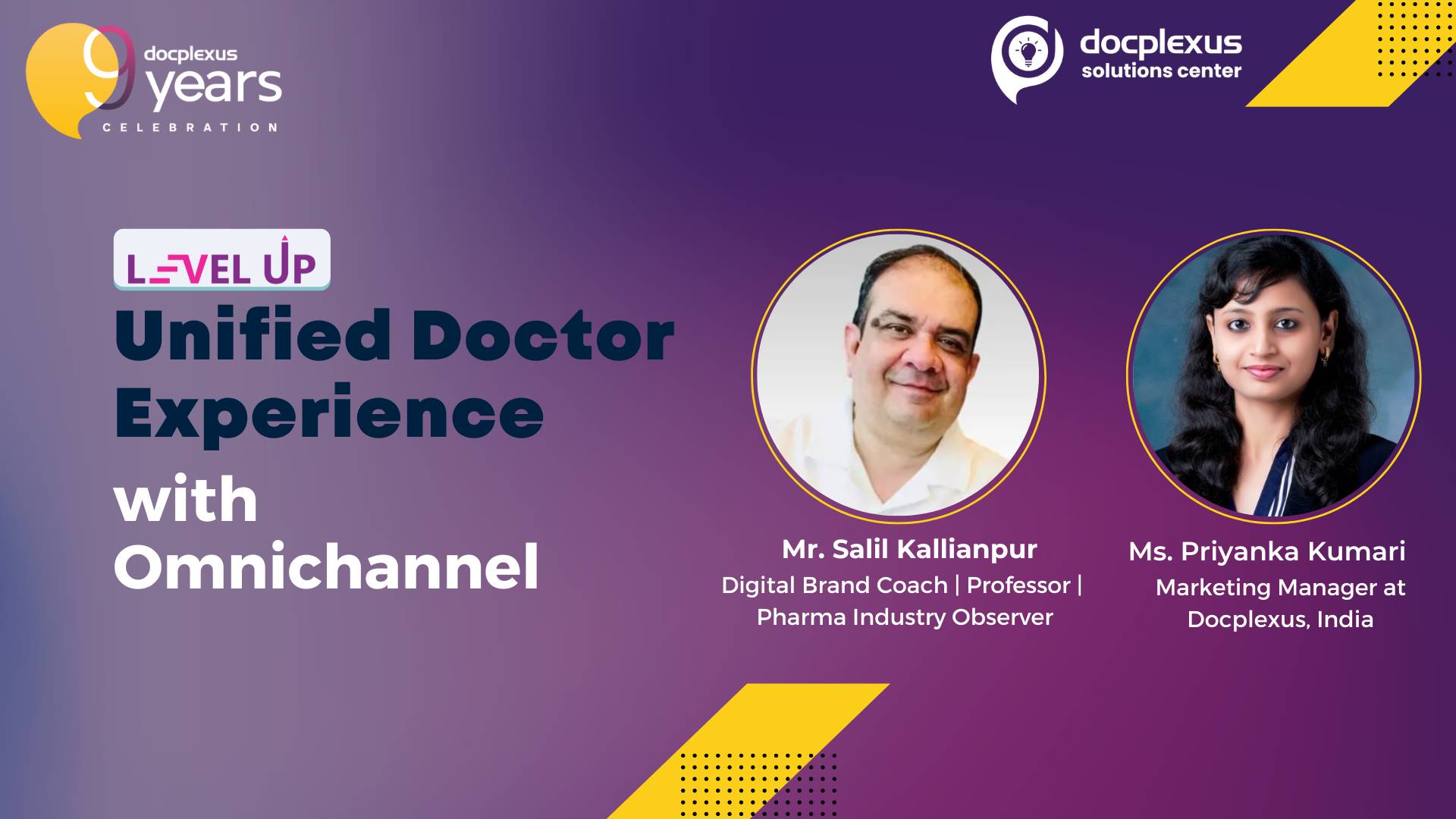Level Up Ep. 1
Omnichannel Marketing in Healthcare
In the world of digital, Omnichannel has been a buzzword for quite some time. Through this article, we intend to explain the subject in simple terms and how it can really be applicable in healthcare.
What is Omnichannel marketing?
Omnichannel is a comprehensive marketing strategy that integrates and collaborates multiple channels used by businesses to communicate with customers. The core objective of this marketing is to place the customer or your doctor at the center of all marketing strategies and provide a consistent, seamless and unified doctor experience.
How does Omnichannel differ from Multichannel strategy?
Both omnichannel and multi-channel approaches are based on the concept of engaging consumers across multiple platforms, yet they are not interchangeable.
Here are a few key differences between these two approaches:
- Customer-centric vs Product-centric
Multichannel strategy aims to reach the maximum no. of doctors through multiple channels but focuses more on the product-oriented conversation.If you are thinking or doing multichannel, these would be your go-to questions –
What is my product? What does my product offer to you? How is my product better than the competition?While omnichannel strategy is customer-centric and aims at understanding about the customer or your doctor first and then designing the communication and leveraging channels to give the information that the doctor wants.If you are really thinking to do omnichannel with your doctors, think about these questions –
What is the doctor’s current knowledge of the category/therapeutic area/specialty where my product is positioned? While prescribing for a patient, what is that the doctor really wants as benefit from the product/molecule? How does the doctor perceive my product vs. the competition and why? - Messaging
The goal of multichannel marketing is to create brand awareness & recognition in the minds of doctors through advertisements & different messages on different channels. On the other hand, omnichannel understands the doctor & aims at delivering customized messages that offer a cohesive doctor engagement. - Consistency
Multichannel strategy approaches each channel differently which results in inconsistent messaging across channels. Omnichannel marketing delivers consistent messaging that creates a holistic customer experience. It also acknowledges the previous touch points along the customer or doctor journey.
Why Omnichannel is important?
You may say that all this is good in concept but how does it really affect your business and marketing objectives. Well, let’s see a few major reasons for why you should adopt it.
- You get rich customer and channel interaction data.
- You get hyper-personalized content and KPI-based campaigns giving higher ROI.
- You adapt to evolving HCP marketing practices.
- You can quickly scale this across geographies with centralized operations done through platform like Docplexus.
- You get tighter marketing & sales collaboration.
How to do Omnichannel marketing in healthcare?
The most important step in adopting omnichannel marketing is the planning stage. Have this in your arsenal and it would be so much easier for you to transform your physical + digital tactics into marketing campaigns with measurable impact.
- Change in mindset – Move from the current product-oriented approach to a customer-centric approach providing relevant information & customized service to the customers.
- Data collection – Know the target customer- demographics, interests, location, etc.
- Customer understanding – Understand the target customers- with respect to their preferred communication channels, type of content formats, time of interaction and how to interact with them.
- Create a personalized experience – Align both offline & online promotions based on their interests to create an integrated experience.
Which are the key performance indicators (KPIs) of omnichannel marketing?
According to the RACE framework, the following are the KPIs in focus across its 4 stages:
- Reach
This phase involves building brand or product awareness & maximizing reach over time across your target audience using multiple channels. The performance can be tracked by using the following metrics:- HCP coverage- The number of customers touched using the digital medium
- Website Traffic
- Number of unique visitors & its value
- Initial Brand Perception about your brand vs competitors
- Act
After successfully driving traffic towards your website or branded micro-site, the next step is to persuade the customers to take action. The metrics are:- HCP engagement on the platform or website or branded micro-site
- Time spent on the platform or website or branded micro-site
- Page visits
- Email Engagement rate- Open rate, click rate
- Doctor’s journey from one topic to another topic about your brand
- Convert
The next stage measures who amongst your interested customers are ready to consider it for prescribing it to their patients. The metrics could be:- No. of sign-ups for the next webinar scheduled
- No. of views on surgical training sessions
- No. of registrations on Accredited CMEs
- No. of downloads of Patient Education Kits from brand
- No. of HCPs interested in knowing about real patient cases using your brand
- No. of HCPs viewing at KOL videos/interviews advocating about your brand
- Engage
This stage focuses on building long-lasting relationships with your doctors to build loyalty & brand advocacy. The metrics include:- A loyal base of doctors
- Comments & articles submitted by doctors with brand/product mentions
- Brand perception Score vs competitors
- HCP satisfaction
Amidst all these KPIs, it is pertinent for healthcare marketers to also understand that omnichannel strategy is all about moving customers through different stages of their knowledge funnel and ultimately influencing their decision or prescription behaviour.
It starts with creating awareness about disease or molecule or your brand to busting myths around your molecule or brand through clinical trials, journal summaries etc. to creating advocacy through KOL opinions, Real World Evidence meetings, Focused Group Discussions, Patient case studies etc. Leveraging channels as per your doctor’s affinity and providing them with tailored information and support with that channel is the way to optimize your omnichannel strategy and create a unified doctor experience.
What Docplexus offers you?
We start the process by understanding your current stage and maturity across channels. Our focus is enhanced doctor engagement and experience alongside developing a measurement framework. We onboard brand and medical affairs team and train them as required on digital strategies. Next we go onto content strategy by configuring content across channels. We also develop Reporting & Analytics framework to measure the outcomes across channels and campaigns.
At every step, we keep in mind your targeted doctor specialties and what do they really need on the disease, category or brand through different surveys, feedbacks and brand perception maps. Powered by both quantitative and qualitative insights thus generated, we achieve content hyper-personalization at a greater scale and drive a 360-degree omnichannel doctor engagement.

